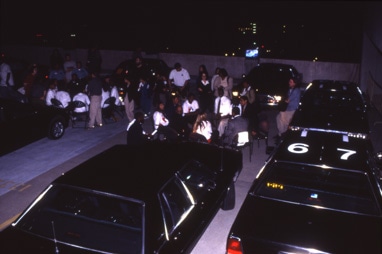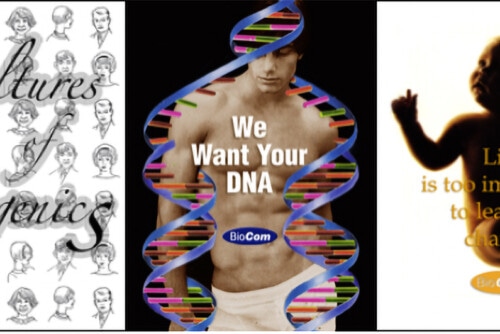In the best parts of our tradition as LGBTQ people for liberation, we have resisted assimilation. We have held die-ins, we have risked our lives at pride celebrations, we have been willing to be part of spectacle and even to be hated—in the hope that our work would mean motion towards liberation. We have witnessed a mainstream LGBT movement that has moved away from these practices, and many of us have spent years in conference centers and hotel rooms all around this country pushing back against a mainstreaming of this movement. It is not enough to disagree with the mainstream agenda. We must be actively creating, resourcing, and organizing new strategies that move a politics of intersectionality into the fields, the small towns, the cities, the bedrooms, the televisions, and the visions of this country and this world. These strategies must work tirelessly to build contagious power with those LGBTQ people who have been left behind by a mainstream gay rights agenda and the unlikely allies who have been passed by. In the past two years, SONG has mobilized and transformed thousands of LGBTQ people in the South through two campaigns. In 2011, our campaign against anti-immigrant hate in Georgia unleashed the power of an unprecedented number of LGBTQ people in a fight for liberation that was not slanted “single-issue” toward the traditional definition of gay rights. In 2012, our fight against the antifamily amendment in North Carolina (denying the basic rights of all unmarried couples and our children) was named by the North Carolina News Service as one of the biggest grassroots efforts in the history of North Carolina. Both of these campaigns happened in the South: the part of the country that the media tells us is the most hateful and hostile to marginalized communities. We know without a doubt that all the successes in this work originate from the thousands of LGBTQ southerners and allies who led these efforts. They are voting for a new queer agenda with their sweat, risk taking, and voices. SONG listened to them, created an organizational container, and provided strategic direction. They did the rest. At every turn, when we reframed messages away from a narrow, single-issue, gay rights agenda, our people on the ground responded with vigorous affirmation, agitation, and effort.
All over this country, our people grow tired of a defensive, apologetic LGBT strategy against the right wing. Bullies do not stop when they are appeased. We have nothing to apologize for, and yet we watch as our own people and issues are publicly “de-gayed,” portrayed as middle-class and white—all in the name of eventual equality. In the South, we watch tall grass grow up over the houses where our neighbors used to live and over the businesses that used to populate our small towns. We watch as our family members are detained and deported, our comrades are pushed involuntarily into sex work just to survive, and our children are incarcerated. We turn on the television and hear a conversation about LGBTQ people every day that names us as perverted; sinful; and worthy of pain, isolation, and death. Yet our mainstream movement, which claims it speaks for us, tells us to wait for policy wins. We are assured that these wins will trickle down to us as some form of victory on our behalf. As people living in the South, as undocumented immigrants, as people of color, as trans people, as rural people, and as people with disabilities, SONG says this is not good enough. In the absence of stronger national leadership, we call on queer liberationists to build and amplify our power and take our rightful leadership regardless of the scale of our organizations: local, statewide, regional, or national. This article seeks to lay out a little bit more about evolving thoughts on how to do just that, from a Southern perspective on queer liberation. We hope that it inspires other groups (who have not already done so) to seize the moment, stop, listen, and respond to the conditions of today.
A Liberation Agenda for All People with LGBTQ Leadership in Its Rightful Place
The following is an evolving definition of queer liberation, compiled from a Queer People’s Movement Assembly in 2012 1:
Queer liberation seeks liberation for all peoples through working for the recognition of our whole selves; the integrity of the relationships and families we embrace; self determination in choices for our bodies in sexuality, gender, eroticism, disability, safety, and privacy; the dignity of our spiritual practices; fairness in our economic systems, our work, and its compensation; full access to participating in and benefiting from society’s institutions; human rights for all; and justice as a birthright for all.
An ongoing queer agenda in the South means we work for participation within our full humanity for LGBTQ people and all people to have dignity, safety, and liberation. We work always from a place of multiplicity, plurality, and transformation. Intersectionality does not mean that we work only with LGBTQ people with similar politics—it means we work within a larger movement for liberation for all people globally and within coordinated and useful roles. For SONG, this means a focus on restoring rightful leadership for LGBTQ people within that struggle for liberation from the origin point of our home in the South.
Southerners on New Ground (SONG) and the South: Who We Are
In 1993, SONG was founded in the vision of three African American and three white lesbians who dared to dream of an organization that could build and sustain organizing across lines of race, class, culture, gender, and sexuality. SONG challenged the notion that justice is about “just us” and began the work of building an infrastructure of southern LGBTQ organizers who could unite a region around our common good—all the way to our core. SONG’s political work was born not just of out of a desire to do cross-issue work, but out of the notion that any movement for LGBTQ people has to account for our racial and ethnic communities, our elders, our children, our bodies, and the land we live on. The idea of going beyond our couple formations and into our relationships with our community by refusing to split people’s identities into boxes was the only way to make our lives visible to other southerners and to each other. For almost 20 years, we have moved, built, and supported groups of LGBTQ people who live and work at the intersections of race, class, culture, gender and sexuality—especially in small towns and rural parts of the South.
SONG’s work in the South is grounded in history, a belief in redemption, and a belief in those who have been left behind by power structures. SONG’s work is grounded in history because this land is thick with what came before us: native peoples; slavery; the civil rights movement; and traditions of resilience, beauty, and pain. We look for redemption because we believe that while the South is a physical geography of white supremacy and poverty (both of which form plantations), mountain top removal, and slave labor, it is also more than that. It is a place of redemption and hope for many—a place where folk reconcile with the past in an honest and painful way, stay in lands riddled with pain, remember old traditions, and birth new ways. We work from a belief in those left behind because although we have been underfunded; lacking infrastructure; brutalized by poverty, racism, homophobia, transphobia, and all manners of oppression—movement people in the South have always been fighting to keep our heads up, like other oppressed people all over the world. We have found creative ways based on kin structures to push toward liberation. We have not turned our backs on food, singing, culture, our elders, our youth, and our craftspeople and artisans. We find joy in unlikely places. For us, being Southerners on New Ground means loving hard histories, giving thanks, making visionary space, pushing forward, being kin, seeking wholeness, and realizing that there is no liberation in isolation.
Our work is inspired, in part, from the great joy you experience when you sit in a member’s kitchen, talking politics, and enjoying the wonderful hospitality of cornbread and greens while looking out the screen door at the creek behind their house. There is great joy when the work connects people who are isolated, gives voice to those who have been denied airtime, and builds folks’ sense of home as a place where they can also be queer. Part of SONG’s work is supporting the unquestionable right to return of all Gulf Coast people, especially people of color and poor people, and it is also SONG’s work to support the right of all LGBTQ and gender nonconforming southerners to return and stay. For many, it is a daily fight to stay home or a brutal process of trying to come home. We love our region and our work is to make it a place where southern queers can come home—and stay home—to live with self-determination, dignity, and respect. Our work is also grounded in the fear and sadness that so many LGBTQ rural and small-town people feel after they have left these homes behind for cities and/or the North. We call on our communities to recognize that turning privileged backs on other peoples’ suffering will never make the hurt go away or make our communities whole.
Violence, unemployment, and severe isolation have been huge deterrents for organizing LGBTQ people in many small southern communities. This is also true in many other communities. In some communities where SONG works, we are the only LGBTQ organization in that community, which has its benefits and challenges. On the positive side, most of our new members are not jaded about organizing, and the scarcity of resources means that members will show up and be deeply motivated to organize. More negatively, many of our members do not know what organizing, or even “gay pride,” are when they first encounter SONG. It takes time to determine where we can go in some communities to connect with our base because there are so few LGBTQ organizations in many southern states. Fewer than 15 southern LGBTQ organizations have a staff of more than three people. The states that do have statewide LGBTQ organizations often have a staff of two or three people for the whole state (with the notable exception of Equality Florida). Most of the campaigns related to LGBTQ issues in the South in the past decade have been initiated by national organizations. SONG’s constituency was recruited into campaigns that they did not choose, and told that the options were to lose big (80-20) or lose less (70-30) in situations such as the marriage amendment fights in Georgia, South Carolina, and Kentucky. These situations have left SONG with a southern base that is largely turned off from national organizations and their efforts.
- People’s Movement Assemblies (PMA) emerged at the U.S. Social Forum in Detroit in 2010. Since then, PMAs organized around different issues have been convening in other places. The Queer People’s Movement Assembly met at the Creating Change conference in Baltimore in January 2012. See peoplesmovementassembly.org for more information.[↑]


